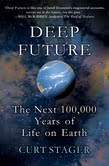Rick Perry's administration has forced a report on the effects of climate change on Texas to remove all references to, well, climate change. But that doesn't change what's happening to the state's climate.

Scientists associated with a major study of environmental changes in the low-lying coastal region around Galveston, Texas, have withdrawn their names from the final report after high-level officials appointed by Governor Rick Perry removed references to sea level rise and climate change from the document.
According to an article in Mother Jones, the scientists had already tried to make their work more palatable to a wide audience by minimizing references to human impacts on climate, limiting most of their analyses to historical rates of local shoreline submergence, sediment deposition by rivers, land subsidence, and the like. Nonetheless, their findings were still unacceptable to the Texas Commission on Environmental Quality, in keeping with the Perry administration's claims that human-driven climate change is a hoax.
The report in question was intended to help Texas cope with serious problems that affect the entire Gulf Coast. It was based upon a peer-reviewed paper that appeared in a major journal in 2008. That paper even contained information that might appeal to those who deny human impacts on climate, including cases in the geologic past when purely natural climatic changes caused coastal flooding, and evidence that today's rapid advance of the sea in the Galveston estuary is not only due to sea level rise but also to land subsidence. Then again, that rapid coastal subsidence is largely due to oil, gas, and water extraction--and admitting that also runs afoul of the Perry administration's story lines.
As this sad tale shows, firm evidence for the real and obvious threats of flooding and long-term submergence around Galveston is being obscured in support of a political agenda. Ironically, such regressive science-denial is not even necessary for a successful political platform. The well-documented consequences of modern climate change still leave plenty of room for reasonable debate over the best ways to deal with them.
The recent "war on science" has been notoriously widespread beyond Texas but, despite this incident, it may also be coming to a close, if editorial descriptions of a growing backlash against anti-science ideology on the political right are correct. Denying physical reality is a losing strategy in the long run. In a less ideologically toxic setting, I suspect that the strong evidence for massive human impacts on the planet would probably trigger conservative urges to, well, conserve vital national assets and resources rather than allow them to be destroyed.
[Image: Flickr user Gage Skidmore]
 Curt Stager is an ecologist, paleoclimatologist, and science journalist with a PhD in biology and geology from Duke University. His new book is DEEP FUTURE: The Next 100,000 Years of Life on Earth (St. Martin's Press, March 2011).
Curt Stager is an ecologist, paleoclimatologist, and science journalist with a PhD in biology and geology from Duke University. His new book is DEEP FUTURE: The Next 100,000 Years of Life on Earth (St. Martin's Press, March 2011).